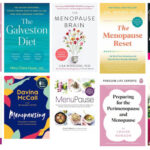10 most asked questions about Menopause and their answers
As we gracefully navigate through the ever-changing landscape of life, many of us find ourselves entering the fascinating (and lets be honest – dreaded) phase known as menopause. No wonder there are many questions! Here are the 10 most asked questions and their answers.
Menopause is a natural transition can bring about a whirlwind of emotions and uncertainties. But fear not, we’re here to embark on a journey together.
So, grab a cozy cup of tea, put your feet up, and let’s dive into the world of menopause, where we’ll uncover answers, dispel myths, and empower you to embrace this chapter with confidence and poise.
- 1. What is Menopause?
- 2. What are the symptoms of menopause?
- 3. What is the difference between menopause and perimenopause?
- 4. How long does menopause last?
- 5. What can I do to relieve my menopause symptoms?
- 6. Should I take hormone therapy?
- 7. How will menopause affect my sex life?
- 8. Will I still need pap smears and mammograms after menopause?
- 9. What are some alternative remedies for menopause symptoms?
- 10. When should I see a doctor?
- More questions?
1. What is Menopause?
Menopause is a natural transition that occurs when a woman’s ovaries stop producing eggs and her menstrual periods cease. It typically occurs between the ages of 45 and 55, but can happen earlier or later.
2. What are the symptoms of menopause?
- Hot flashes:
Sudden sensations of heat, often accompanied by sweating and flushing - Night sweats:
Excess sweating during sleep - Irregular periods:
Periods that are heavier, lighter, or more frequent than usual - Vaginal dryness:
Reduced moisture in the vagina, which can lead to discomfort during intercourse - Sexual problems:
Decreased libido, difficulty with arousal, and painful intercourse - Mood swings:
Irritability, anxiety, and depression - Sleep problems:
Difficulty falling asleep or staying asleep - Weight gain:
Unexplained weight gain, especially around the middle - Headaches
- Joint aches and pains
3. What is the difference between menopause and perimenopause?
Perimenopause is the period of transition leading up to menopause. It can start several years before menopause and last for several years. During perimenopause, the levels of the hormones estrogen and progesterone fluctuate, which can cause a variety of symptoms similar to those of menopause, but they may be more erratic and unpredictable.
4. How long does menopause last?
Menopause is officially defined as the point at which a woman has not had a period for 12 months in a row. However, the symptoms of menopause can last for several years before and after this point.

5. What can I do to relieve my menopause symptoms?
There are a number of things that you can do to relieve your menopause symptoms, including:
- Lifestyle changes:
Eating a healthy diet, exercising regularly, getting enough sleep, and managing stress can all help to improve your overall health and well-being and may help to reduce some of your symptoms. Some foods are especially helpful in alleviating menopause symptoms – read about them here. - Over-the-counter medications:
Over-the-counter medications such as ibuprofen or acetaminophen can help to relieve pain and discomfort. - Prescription medications:
If your symptoms are severe, your doctor may prescribe medication to help relieve them. This may include hormone therapy, antidepressants, or other medications. - Natural Remedies:
There are several natural remedies that are very helpful in reducing or calming menopause symptoms.
6. Should I take hormone therapy?
Hormone therapy is a treatment that replaces the estrogen and progesterone that the body stops producing during menopause. It can be an effective way to relieve many of the symptoms of menopause, including hot flashes, night sweats, and vaginal dryness. However, hormone therapy can also increase the risk of certain health problems, such as blood clots and stroke. Talk to your doctor about whether hormone therapy is right for you.
7. How will menopause affect my sex life?
Menopause can cause a number of changes that can affect your sex life, including vaginal dryness, decreased libido, and difficulty with arousal. However, there are a number of things that you and your partner can do to keep your sex life healthy and fulfilling.
- Communicate with your partner:
Talk to your partner about your concerns and how you can work together to keep your sex life enjoyable. - Use lubrication:
Use a lubricant to reduce vaginal dryness and make intercourse more comfortable. - Experiment with different positions and activities:
Try different positions and activities to find what works best for you and your partner.

8. Will I still need pap smears and mammograms after menopause?
Yes, you will still need to have regular pap smears and mammograms after menopause. Pap smears can help to detect cervical cancer, while mammograms can help to detect breast cancer.
9. What are some alternative remedies for menopause symptoms?
There are a number of alternative remedies that have been shown to be effective for relieving menopause symptoms, including:
- Acupuncture:
Acupuncture is a traditional Chinese medicine technique that involves inserting thin needles into specific points on the body. - Yoga:
Yoga is a mind-body exercise that can help to reduce stress, improve flexibility, and promote relaxation. - Meditation:
Meditation is a mind-body practice that can help to reduce stress, improve focus, and promote relaxation. - Mindfulness-based stress reduction (MBSR):
MBSR is an eight-week program that teaches people how to be more mindful and less reactive to stress.

10. When should I see a doctor?
You should see a doctor if you have any concerns about menopause, such as:
- Your symptoms are severe or are interfering with your daily life
- You have not had a period in 12 months
- You have any bleeding after menopause
- You have any other concerns about your health
More questions?
We’re sure there are many more questions when it comes to Menopause and Peri-menopause, that’s why we put together a list of best selling books about Menopause and the many facets and aspects. Check it out, maybe there is one that speaks to you and might help you to conquer this transitional phase.
Privacy Policy | Terms & Conditions | Disclaimer | Cookie Policy


One thought on “10 most asked questions about Menopause and their answers”